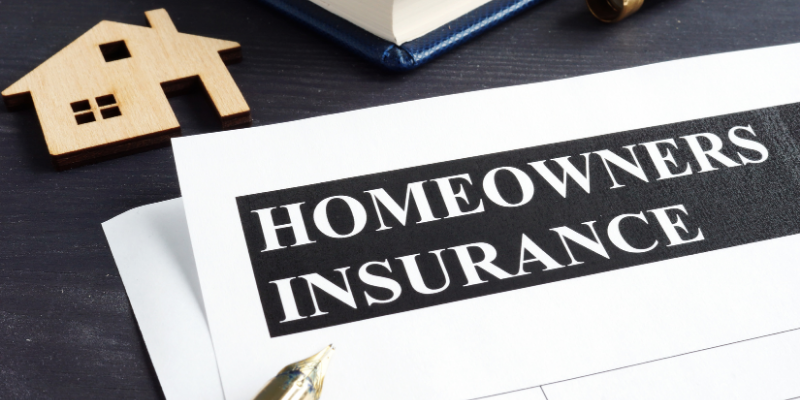
Understanding Homeowners Insurance: A Comprehensive Guide
Homeowners insurance is a crucial aspect of owning property, especially in a dynamic real estate market like Chicago. This type of insurance offers protection against various risks, including damage from natural disasters, theft, and liability for accidents that occur on the property.
When considering switching homeowners’ insurance after closing on a home, it’s essential to understand the coverage options available. Policies typically cover the structure of your home, personal belongings, and additional living expenses if you are temporarily displaced.
In Chicago, where weather conditions can be unpredictable, ensuring your policy includes adequate coverage for events such as hail or windstorms is particularly important. Additionally, evaluating your liability coverage is vital to protect against potential lawsuits arising from injuries on your property.
Comparing premiums and deductibles across different insurance providers can lead to significant savings while ensuring comprehensive protection. Understanding these elements will empower homeowners to make informed decisions when switching policies post-closing and effectively secure their investment.
If you’re preparing to sell your home in Chicago, it’s equally important to confirm your homeowners’ insurance remains active throughout the listing and closing period. Unexpected issues like storm damage or accidents can affect showings or delay transactions. The Illinois Real Estate Buyers team can help you navigate both the selling process and the necessary insurance considerations to keep everything running smoothly. Reach out to us today to get started.
Key Factors to Consider When Choosing Homeowners Insurance
When choosing homeowners’ insurance after closing on a property in Chicago, several key factors should be carefully considered to ensure comprehensive coverage and financial protection. Start by evaluating the policy’s coverage limits, ensuring they adequately reflect the replacement cost of your home and personal belongings.
Pay close attention to specific perils covered, especially those relevant to the Chicago area, such as windstorms or severe winter weather. It’s crucial to understand the policy’s deductibles and how they might affect out-of-pocket costs during a claim.
Consider the insurer’s reputation for customer service and claims processing efficiency, as these aspects can greatly impact your experience if you need to file a claim. Reviewing available discounts can help reduce premiums; common discounts include those for security systems or bundling policies with the same provider.
Additionally, investigate any exclusions or limitations within the policy to avoid unexpected gaps in coverage. Finally, comparing quotes from multiple insurers provides a broader perspective on pricing while helping identify the best value tailored to your specific needs in Chicago’s real estate market.
Essential Coverage Options in a Homeowners Insurance Policy
When switching homeowners’ insurance after closing on a property in Chicago, it’s crucial to ensure your policy includes essential coverage options that protect your investment. Dwelling coverage is fundamental, safeguarding the structure of your home against damage from perils like fire or windstorms.
Personal property coverage is equally important, providing protection for your belongings in case of theft or damage. Liability insurance is another critical component, offering financial protection if someone is injured on your property and decides to sue.
Additional living expenses (ALE) coverage can be vital if a covered event forces you to temporarily relocate; it helps cover costs such as hotel stays and meals. In Chicago, where the weather can be unpredictable, considering flood or earthquake insurance might also be prudent, even though these are often not included in standard policies.
Always assess the replacement cost value over the actual cash value to ensure adequate compensation without depreciation deductions. Evaluating these options thoroughly will help secure comprehensive protection tailored to your needs when switching homeowners insurance after closing on a home in Chicago.
Understanding Liability Coverage in Your Homeowners Insurance Policy
When switching homeowners’ insurance after closing on a property in Chicago, it’s crucial to understand the details of liability coverage within your policy. Liability coverage is a fundamental component that protects you from financial responsibility should someone sustain an injury on your property or if you accidentally cause damage to another person’s property.
In Chicago’s bustling real estate market, ensuring adequate liability protection is essential, as it can cover legal costs and potential settlement fees arising from unforeseen incidents. As you evaluate new insurance options, consider the amount of liability coverage offered and how it aligns with your specific needs and lifestyle.
Many policies offer different levels of protection, so reviewing these options carefully will help safeguard your assets against unexpected claims. Additionally, understanding any exclusions or limits associated with liability coverage is crucial to avoid gaps in protection, especially in a vibrant city like Chicago, where unique risks may arise.
How Natural Disasters Affect Homeowners’ Insurance Rates

Natural disasters have a significant impact on homeowners insurance rates, particularly in regions like Chicago, where unpredictable weather patterns can pose various risks. Insurance providers assess the likelihood of events such as floods, tornadoes, and severe storms when determining premiums.
In areas prone to flooding, for instance, rates may be higher due to the increased risk of water damage claims. Similarly, if a neighborhood is susceptible to wind damage from tornadoes or heavy storms common in the Midwest, insurers might adjust their pricing accordingly.
The frequency and severity of these natural disasters directly influence underwriting processes and risk assessments conducted by insurance companies. As climate change continues to alter weather patterns, homeowners in Chicago must stay informed about how these changes could affect their insurance costs.
Understanding the correlation between natural disasters and insurance rates can guide homeowners when choosing policies that offer adequate coverage while remaining cost-effective after closing on a home.
The Role of Credit Scores in Determining Homeowners’ Insurance Costs
Credit scores play a crucial role in determining homeowners’ insurance costs, especially for Chicago residents considering switching policies after closing on a home. Insurers use credit-based insurance scores to assess the likelihood of a policyholder filing a claim, impacting premium rates significantly.
A higher credit score often translates to lower premiums, as insurers perceive these individuals as lower risk. Conversely, those with lower credit scores may face higher premiums due to perceived increased risk.
In Chicago’s competitive real estate market, maintaining a strong credit score can be advantageous when shopping for more affordable homeowners’ insurance options post-closing. Credit scores are considered alongside other factors like the home’s location and age, but they remain a pivotal element in the underwriting process.
Potential savings from improved credit scores underscore the importance of financial management for homeowners seeking better insurance rates.
Differences Between New Construction and Existing Homes in Terms of Insurance
When it comes to homeowners’ insurance, new construction and existing homes in Chicago present distinct considerations that can influence your policy decisions after closing. New construction homes often come with modern building materials and updated systems that can result in lower insurance premiums due to reduced risk factors, such as fire hazards or structural issues.
These newly built properties may also benefit from warranties that cover certain damages, potentially decreasing the need for extensive coverage initially. Conversely, existing homes might require more comprehensive insurance policies, as they are more likely to have aging infrastructures, outdated electrical systems, or plumbing concerns, which increase the likelihood of claims.
Insurers may assess higher premiums for older homes because of these increased risks. Additionally, historical properties or those located in specific neighborhoods might demand specialized coverage options due to unique architectural features or local regulations.
Understanding these differences is crucial when evaluating homeowner insurance needs post-closing in the dynamic Chicago real estate market.
Common Mistakes to Avoid When Selecting Homeowners’ Insurance
When switching homeowners insurance after closing on a property in Chicago, many make the mistake of not comparing multiple quotes, which can lead to overpaying for coverage. It’s crucial to evaluate different policies and ensure they offer adequate protection for your specific needs rather than simply opting for the cheapest option.
Another common error is neglecting to review the terms and conditions thoroughly; this oversight can result in unexpected exclusions or limitations in your coverage. Additionally, failing to inform your mortgage lender about the change in insurance can create complications, as lenders typically require proof of insurance that meets their criteria.
Homeowners often overlook discounts they may be eligible for, such as bundling insurance policies or installing security systems. Lastly, some homeowners mistakenly cancel their old policy before confirming that the new one is active, leaving them temporarily uninsured and at risk.
Careful planning and attention to detail can help you avoid these missteps when selecting homeowners’ insurance post-closing in Chicago’s real estate market. If you’re also planning to sell, you can sell your Illinois house faster and in nearby cities by working with professionals who understand both real estate and insurance dynamics.
Comparing Homeowners Insurance Policies: What You Need to Know
When switching homeowners’ insurance after closing on a property in Chicago, it’s crucial to compare policies carefully to ensure you maintain adequate coverage while optimizing costs. Begin by examining the coverage limits and types of protection offered by different insurers, focusing on aspects like dwelling coverage, personal property protection, liability insurance, and additional living expenses.
Pay close attention to policy exclusions and endorsements that might affect your specific needs as a Chicago homeowner. Evaluate each insurance company’s reputation and financial stability to ensure they can handle claims efficiently.
Additionally, consider factors such as premiums, deductibles, and available discounts that can impact the overall cost of your homeowners insurance. It’s also beneficial to assess how each policy handles natural disasters common in the Chicago area, such as severe storms or flooding.
By thoroughly comparing these elements, you can make an informed decision that protects your investment while potentially saving money in the long run.
Customizing Your Policy: Endorsements and Riders Explained
When switching homeowners’ insurance after closing on a property in Chicago, understanding how to customize your policy with endorsements and riders is essential. Endorsements and riders allow you to tailor your homeowners insurance coverage to better meet your specific needs, providing additional protection beyond the standard policy.
For instance, if you own valuable items like fine art or jewelry, you might consider adding a scheduled personal property endorsement to ensure these possessions are fully covered. Additionally, Chicago’s unique climate might prompt you to add a water backup endorsement for enhanced protection against basement flooding due to heavy rains.
Understanding these options can help you optimize your policy by addressing potential risks associated with owning a home in Chicago, ensuring comprehensive coverage that reflects your lifestyle and personal assets. Customizing your homeowners insurance through endorsements and riders not only safeguards your investment but also provides peace of mind as a new homeowner in this vibrant city.
How to Effectively Reduce Your Homeowners’ Insurance Premiums

After closing, your homeowners’ insurance premiums in Chicago can be lowered by reviewing and updating policies as necessary. An increase in deductible withdrawal will reduce the premium rate while still ensuring acceptable coverage is in place.
There is always an opportunity for great savings by bundling your auto and homeowner insurance, as this provides discounts from insurers. Moreover, enhancing the security of the home with smoke detectors and burglar alarms will also lead to lower rates.
Everything else being constant, a good credit score paired with failing to overestimate personal belonging value and keeping riders and add-ons on the policy to a minimum will reduce costs.
The use of an experienced local agent who specializes in Chicago real estate enables you to capture the nuance of these trades and provides ample opportunity for advice on getting the best rates without sacrificing coverage.
The Advantages of Changing Homeowners’ Insurance Companies
Changing homeowners’ insurance providers immediately after closing on a property in Chicago may offer various advantages that would optimize coverage and cost for the homeowner. Insured individuals can examine different options to enjoy better rates than their current premiums, leading to massive savings over time.
In addition, the ability to change providers enables homeowners to customize their coverage more accurately to reflect personal requirements and risks associated with living in Chicago, including severe weather and urban-related incidents. In addition, there are other insurance companies that offer better customer service and efficient claims processing.
Homeowners insurance with other types of coverage, such as auto insurance, may provide discounts, and other security system installations may lead to reduced risk incentives for policyholders. The homeowners’ insurance provider reevaluation and selection process allows property owners in Chicago to increase their sense of warranty and protection.
Working Through Claims with Your Homeowners Insurance Provider
Working through claims with your homeowners insurance provider in Chicago requires a plan to ensure movement in the right direction at the right time and optimal coverage. After closing on a property, most people have no idea of what potential claims their policies might cover.
The first thing to do is to go over the hearing details and disputes with the ones in charge. They should spell out the deductible, limits, and possible exclusions that might inhibit filing a claim. As much as possible, try to remember the details of all events and damages as they happen. Always have photographs and proper files to back your claim.
Your insurance agent can help you maintain open works so that this functions smoothly as far as concrete steps and documents needed spiral around policy details. Given the extremes of climate in Chicago, one should always be geared up to deal with some of the local risks: storm water damage, flooding, mudslides, etc.
Proactive steps should engage area insurers, as a more efficient approach would be to painstakingly follow the requirements to claim compensation fairly and on time.
The Process of Documenting Belongings for Accurate Claims
During the change of your homeowners insurance policy after closing on a house in Chicago, documenting your belongings is very important. Thoroughly listing your belongings ensures that every item listed has a corresponding coverage, which is of utmost importance during claims filing after a loss or damage incident.
The process begins with taking photographs of all the items along with a detailed list explaining each item along with serial numbers, purchase dates, and receipts that provide evidence of their value. This helps not only in making your policy selection easier but also in providing a streamlined process for settling claims with the insurer.
This mitigates disputes during the claim processing phase and assures that all the valuables are fully compensated for. Claims disputes often arise when there are not enough documents to prove the worth of your items. Apart from proof, maintaining records helps in tracking purchases and providing accuracy in the coverage offered under your homeowners insurance policy.
How Renovations Can Impact Your Existing Homeowner’s Coverage
Significant renovations may affect the homeowner’s insurance policy, particularly for those who have just closed on a property in the Chicago real estate market. It is important to assess your homeowner’s insurance policy when your home undergoes substantial repairs like kitchen remodels, new bathrooms, or basement finishing.
These home alterations can increase the value of your home, and, thus, the coverage limits should be adequately adjusted to provide adequate protection. Failure to update the insurance policy after ample renovations can potentially underestimate the insurance policy when damages or loss of property occur.
Moreover, some changes can place the homeowner in a better position to claim discounts on homeowner’s insurance policies; installing new roofs or upgrading security systems are good examples. On the other hand, failure to notify the insurance company about such changes can result in gaps in coverage and problems when trying to file a claim in the future.
It is a better course of action for Chicago homeowners to contact their insurance agents before commencing major renovation projects so that policies can be reviewed to ensure that their investment against area-specific risks remains fully protected.
The Process of Changing Your Homeowners’ Insurance After Closing
Changing homeowners’ insurance after purchasing a home in Chicago revolves around important actions that guarantee continuous protection. Firstly, it is recommended that you check your policy documents to understand if there are any particular gaps in coverage that exist.
After determining the gaps in coverage, make sure to evaluate other insurers located in Chicago so as to obtain new quotes and policies. You should also take into consideration the premiums involved, deductible amounts, and limits under each policy.
After choosing the new insurer, make sure to arrange with them to align the start date of the new policy with the cancellation date of the old one. It is advisable that you do not have any periods with no coverage at this time.
Make sure to tell your mortgage lender about the new insurance policy so that you remain compliant with the loan, since most lenders ask for homeowners’ insurance with no gaps in coverage. Lastly, check that the new policy change is reflected on all documents, with escrow accounts being adjusted where applicable.
Following the above steps will ensure that you protected your home adequately while dealing with Chicago’s peculiar real estate demands.
Can I Switch Home Insurance After Closing?

Yes, you can change your homeowners’ insurance after closing on your house in Chicago. A lot of homeowners think that once they have closed on the deal, they are stuck with the home insurance policy they chose.
That is not the case. In fact, there are numerous homeowners who switch their home insurance policies after closing the deal, which ends up saving them a lot of money and providing better customized coverage.
It’s equally necessary for homeowners in Chicago to periodically check their insurance coverages so that they are not underinsured for certain risks that are prevalent in the area, such as severe winter weather or flooding from Lake Michigan. In order to change your policy, the first step would be gathering quotes from multiple insurers. Make sure to take into account their reputation, customer service record, coverage, and premiums that are provided.
After selecting a suitable policy, inform both your current insurer and mortgage lender of the policy change so that all parties can ensure the change happens without any hitches. Also, ensure that there is no gap in coverage during the switch, as that can leave the home vulnerable. Lastly, if you are also selling your house, cash home buyers in Chicago and nearby areas provide a very quick and convenient option that fits well with your insurance and financial needs.
Is There a Penalty for Changing Homeowners Insurance?
Changing homeowners’ insurance policies after closing on a home in Chicago is a strategy that lots of new homeowners think about, often to get better services or even lower prices. The good news is that there is usually no cost associated with switching your homeowners insurance after closing, so long as you keep coverage on your home.
The critical information is to make sure there are no gaps in coverage, which could create the risk of your house being unprotected and could breach your mortgage terms. It’s important to arrange the effective date of the new policy with the expiry date of the old one to ensure that the two do not have any gaps.
Also, note that some providers may impose a nominal charge for policy cancellation, and although there are these charges, they would be small compared to the better insurance coverage your policy holds. It pays off to analyze deeply the existing policies and the ones being proposed, as this helps grasp the financial consequences.
In the ever-changing Chicago real estate scene, taking initiative about homeowners’ insurance can prove quite beneficial with no drawbacks.
Is It Hard to Change Homeowners’ Insurance with Escrow?
For homeowners in Chicago, switching homeowners insurance as well as the escrow account is a simple procedure that can have major advantages. Your lender creates an escrow account to pay for your taxes and insurance payment, typically during the closing of a home.
For a lot of people, changing insurance providers sounds like a daunting task, especially after closing, but in most cases, that is not true. The bulk of the work comes down to choosing the correct policy that meets the insurance guidelines of the lender, informing your insurance company, and notifying the mortgage servicer about the switch.
While switching, it is equally important to ensure that no gaps in coverage happen. Most of the time, your new insurance agent will be able to take care of a lot of the work, like canceling your previous policy and changing the escrow account details.
For people trying to optimize their financial obligations after closing, considering switching homeowners insurance is important because you might have access to better rates and improved terms to take advantage of in Chicago’s fast-moving real estate environment.
Can I Change Homeowners Insurance Anytime I Want?
Indeed, homeowners located in Chicago are permitted to modify their homeowners insurance policy at nearly any point, even post-property acquisition. It is pivotal to make certain that you maintain uninterrupted coverage that protects your investment and satisfies your lender’s terms.
While switching your homeowners insurance, make certain that you check different providers to know whether they have better coverage and rates than what you currently have. Once you are done informing the insurance company about their decision regarding the policy cancellation, make sure you confirm the commencement date of the new policy with the old provider to eliminate chances of coverage lapses.
Furthermore, it is equally important to notify your mortgage company so that they can make the necessary changes with the new insurance information. Changing the homeowners insurance policy not only helps these residents to optimize their protection but also saves money while complying with mortgage terms.
Need to sell your home? You can do so effortlessly with Illinois Real Estate Buyers. We provide an easy and hassle-free way to sell your property without making any repairs, as well as a fair cash offer. To discuss our non-obligatory proposal, give us a call on (773) 305-6373. Start right now!
Helpful Chicago Blog Articles
• How Much Is Home Staging Cost in Chicago, IL
• Can You Sell A House With Asbestos in Chicago, IL
• How To Sell An Inherited House In Chicago, IL
• How To Do Sale By Owner in Chicago, IL
• Selling Your Parents’ House In Chicago, IL
• Homeowners Insurance After Closing: A Chicago, IL
• Free Things to Do in Chicago, IL
• Can An HOA Take Your Home In Chicago, IL
• How to Sell a Fixer-Upper Home in Chicago, IL
• Homeowners Insurance When Selling Your Chicago, IL
• Navigating The Sale Of Your Chicago, IL Home With A Reverse Mortgage
• Selling Your Chicago, IL, Home Below Market Value
• Refinancing Your Home After Divorce In Chicago, IL

| INSURANCE CLAIMS | VACANT HOME INSURANCE | HOMEOWNER’S INSURANCE | HAZARD INSURANCE | CONDO INSURANCE | HOME LOAN |
| MORTGAGE LOAN | HOME MORTGAGES | FIRST MORTGAGE | MORTGAGE INTEREST | MORTGAGE RATES | BANK LOAN |
| LENDING | CHICAGO, ILLINOIS | CITY OF CHICAGO | MOTORCYCLE INSURANCE | CAR INSURANCE | BANK |
| BANKING | RENTERS | RENTAL PROPERTY | STATE OF ILLINOIS | ILLINOIS | INTEREST |
| TAXES | INFORMATION | REFINANCE | REFINANCING | MORTGAGE REFINANCE | LIFE INSURANCE POLICY |
| LIFE INSURANCE | UMBRELLA | INTEREST RATE | REASON | HELOC | HOME EQUITY LINES OF CREDIT |
| HOME EQUITY LINE OF CREDIT | CREDIT CARD | PROPERTY TAXES | EQUITY | LINE OF CREDIT | LINES OF CREDIT |
| HOME EQUITY | PRINCIPAL | DEBT | CREDIT REPORT | UMBRELLA INSURANCE | CHECKING ACCOUNT |
| REPLACEMENT VALUE | APPRAISAL | HOME APPRAISAL | REAL ESTATE AGENTS | NATURAL CALAMITIES | LANDLORD |
| FINANCE | ESTATE AGENTS | CONSUMERS | TEXAS | GOAL | FLOOD INSURANCE |
| UNDERWRITERS | TRAMPOLINE | REAL ESTATE TRANSACTION | PRICE | NATIONAL ASSOCIATION OF INSURANCE COMMISSIONERS | |
| NATIONAL ASSOCIATION OF INSURANCE COMMISSIONERS (NAIC) | MONEY MARKET ACCOUNTS | MONEY MARKET | MOLD | LICENSE | EXPERT |
| YOUR HOMEOWNERS POLICY | YOU HAVE A MORTGAGE |
